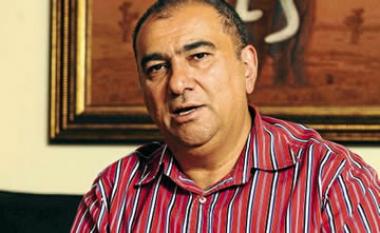PPC’s wage cut move 'very significant'
 With effect from October last year‚ CEO Ketso Gordhan took a R1m pay cut‚ while about 60 senior managers’ pay was frozen in order to increase the wages of the group’s 1 200 lowest earners.
With effect from October last year‚ CEO Ketso Gordhan took a R1m pay cut‚ while about 60 senior managers’ pay was frozen in order to increase the wages of the group’s 1 200 lowest earners.
Five months after cement group PPC froze top management salaries in order to increase the wages of its lowest earners — a move that has generally been welcomed — analysts say it is too early to assess whether it will have a material effect on labour relations.
With effect from October last year‚ CEO Ketso Gordhan took a R1m pay cut‚ while about 60 senior managers’ pay was frozen in order to increase the wages of the group’s 1 200 lowest earners.
PPC’s annual report shows it was able to implement a once-off raise of R875 a month for semiskilled employees.
The company’s minimum wage for permanent full-time employees was raised to R6 500 a month.
Mr Gordhan says the gesture has been “very well received” by the firm’s employees”.
Both the private and public sectors have come under pressure to narrow the pay differentials between management and entry-level positions.
Independent labour analyst Tony Healy says there is “no doubt” PPC’s actions were “very significant” and honourable‚ and will contribute “to narrowing the inequality gap”.
However‚ Mr Healy says labour relations do not operate in vacuums and many workers may still feel frustrated by a lack of service delivery and high inflation‚ “so there’s only so much an employer can do”.
“You’ll find that when you do get these‚ let’s call it ‘decent increases’‚ generally speaking there is a kind of honeymoon period of satisfaction and gratitude which quickly wanes‚” he says.
However‚ while the effect on industrial relations will not necessarily be profound‚ “it’s difficult to criticise what they’ve done”‚ Mr Healy says.
“It’s an important step which is going to need to be followed up with similar initiatives which have the potential to enhance labour relations in general.
"That includes not just what you pay people‚ but management style‚ how you resolve disputes‚ and the extent to which you have joint decision-making or consultation forums.”
Though it is too early to call‚ PPC could become a model for constructive labour relations‚ as Cashbuild was in the early 1990s.
“Cashbuild held annual collective bargaining indabas with all their staff‚ and the business schools were all talking about the Cashbuild model‚” he says.
Senzeni Zokwana‚ a veteran trade unionist and president of the National Union of Mineworkers (NUM) — which represents a number of PPC workers — sees the initiative as a positive one that others should follow.
“As a union we have been calling for a freeze in the salaries of senior managers … so that you can give more to lower-category workers‚ the aim being to close the apartheid wage gap‚” he says.
Mr Zokwana says that‚ given the constraints on many businesses due partly to commodity prices‚ “I think that gesture would be welcomed”.
He says workers have generally not received decent increases‚ with companies citing depressed commodity prices and economic strains on their operations.
PPC has provided an example to other companies that when trading conditions are tough they can still improve workers’ salaries.
Adcorp labour market economist Loane Sharp is more cautious. He believes “populist” moves to reallocate resources “on spurious or uneconomic grounds” can be damaging to the economy as a whole.
“Labour relations measures that promote productivity and on-the-job performance should be encouraged‚” he says.
“Businesses and their employees attain the highest levels of profits and wages when employees are paid for the value they create.
“In PPC’s case‚ it may well be that management adds less value and workers add more value‚ in which case PPC’s decision to reallocate resources away from management towards workers is justified‚ depending on the merits of the case‚” Mr Sharp says.
He says the growing movement towards worker protection and the reallocation of resources by companies “is usually a farce” as it often does not improve productivity and value creation.
While many believe the move by PPC is a positive one‚ it does raise the question of whether such initiatives might have an adverse effect on South Africa’s income tax revenue‚ given that lower-paid workers are taxed at far lower rates than top earners‚ who are taxed at a marginal tax rate of as much as 40%.
However‚ Wolfsohn & Associates partner Colin Wolfsohn says this fall in income tax revenue would be offset to some degree by a labour force with more disposable income‚ which would contribute to greater VAT collections.












